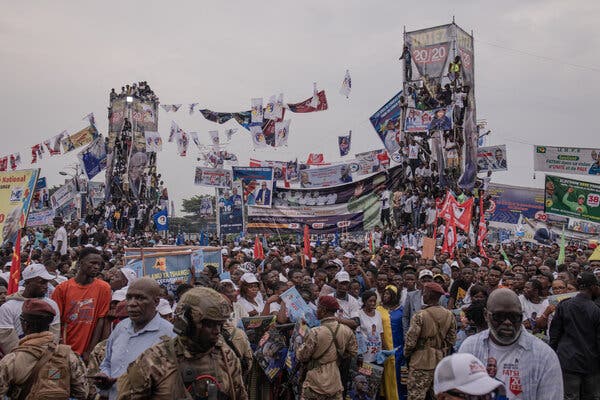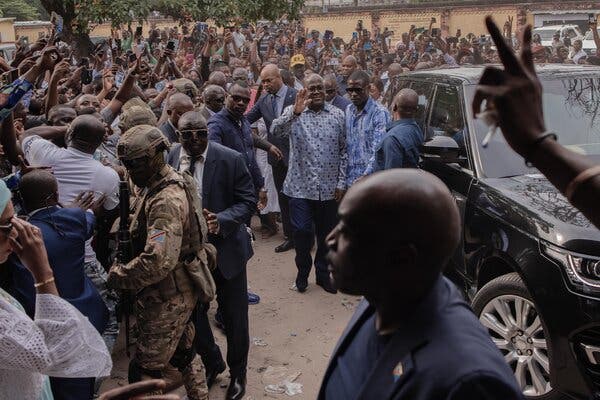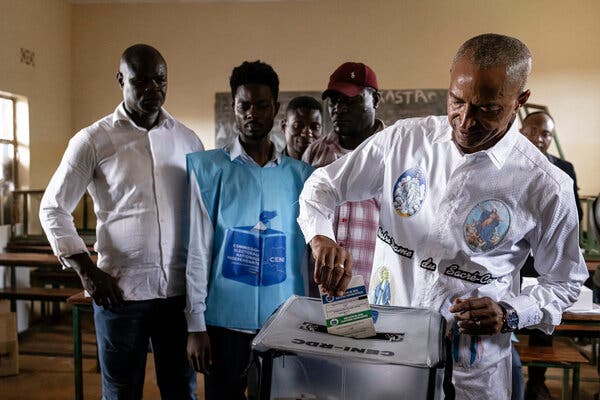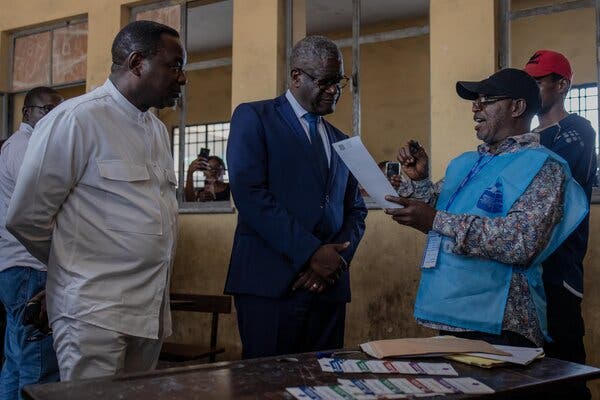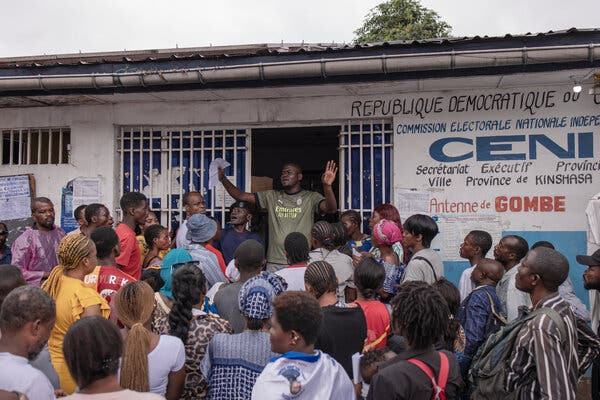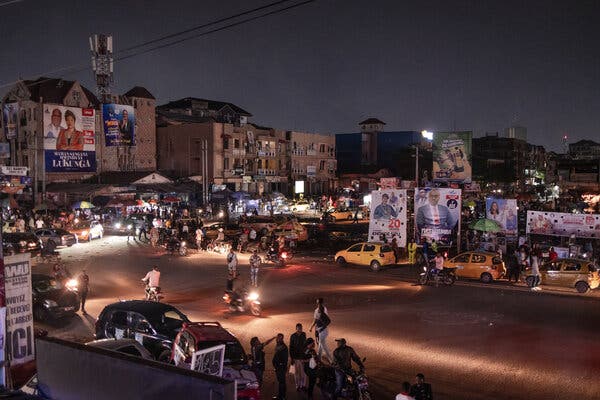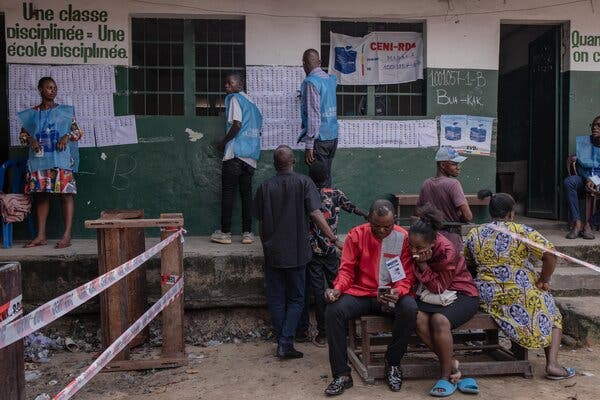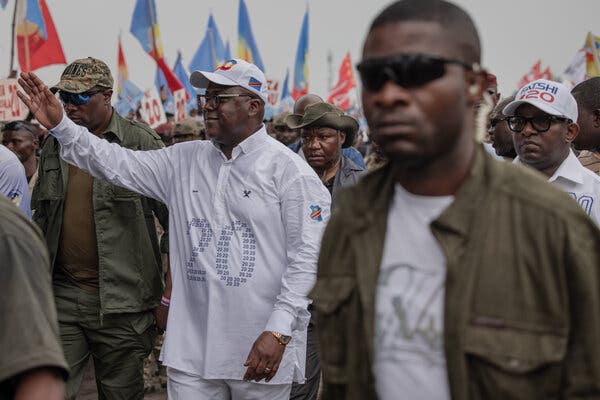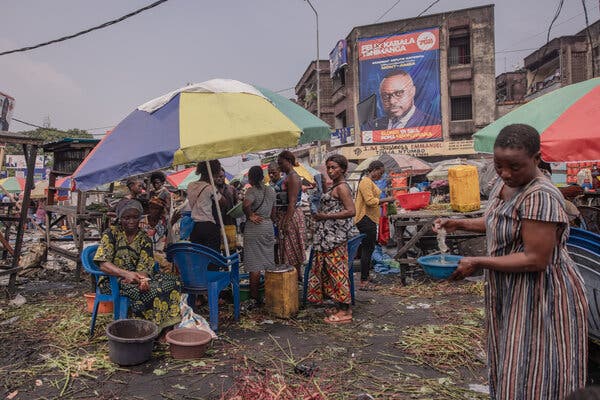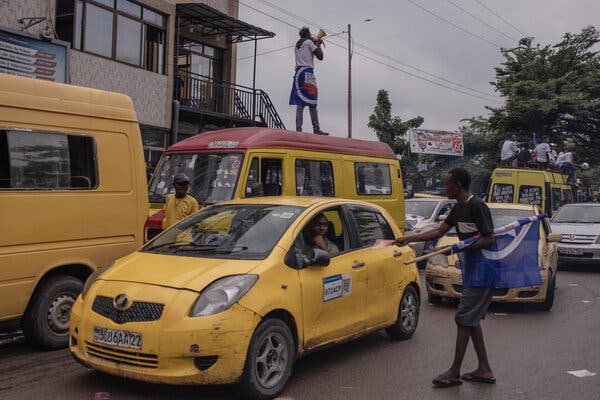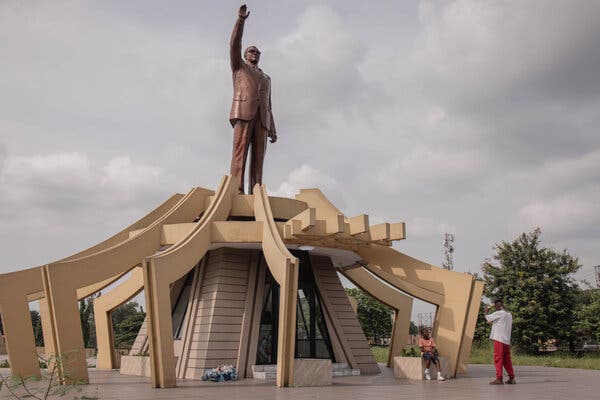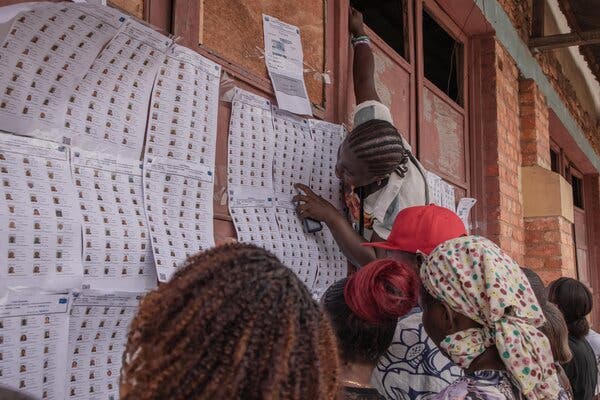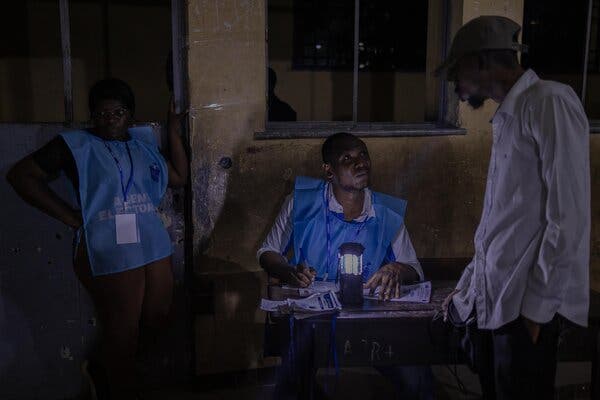19 November 2023
Kuelekea uchaguzi mkuu nchini DR Congo nchi yenye utajiri mkubwa wa maliasili kama madini, uvunaji magogo ni watia nia wawili wa uRais ndiyo wanaoutia moto uchaguzi
View: https://m.youtube.com/watch?v=XzU9u6Y4bzg
Moïse Katumbi amewasiki Maniema na kupokelewa na umati mkubwa wa mashabiki wake.
Pia rais Felix Tshisekedi naye leo jijini Kinshasa mkutano wake mkubwa katika uwanja wa Mashujaa - Stade des Martyrs Kinshasa watu wengi wamejitokeza
View: https://m.youtube.com/watch?v=StYZZ-F2C0w
Kampeni za uchaguzi kwa ajili ya uchaguzi uliopangwa kufanyika Desemba 20, 2023 uchaguzi wa urais, wa wabunge na wa magavana zinaanza nchini Jamhuri ya Kidemokrasia ya Kongo, Jumapili Novemba 19, 2023.
Wagombea 26 wanawania kwenye kiti cha urais , yaani, misafara mingi ya kampeni ambayo itaanza kote nchini. Lengo: kuwashawishi wapiga kura milioni 44.
"Kwa hakika, tunajua kwamba mambo yanaanza siku ya Jumapili": Watu wengi huzungumza kuhusu kampeni ya uchaguzi. Nafasi ya kuchagua kati ya wagombea 26.
“Tunasubiri kila mgombea aweze kuwasilisha sera zake za kampeni na mradi wake wa utawala, na tutaona, tutathmini kile ambacho kila mmoja amezungmzia, tutaamua tumchague nani", amesema édric , mmoja wa wakaazi wa mji wa Kinshasa aliye hojiwa na mwanahabari wetu.
Mbele kidogo, Peter anafanya kazi kwa bidii: yeye ni moja wa wasimamizi wa kampuni ya basi na anasema ana shauku kubwa uchaguzi unapokaribia. “Inatusaidia kwa sababu inasogeza nchi mbele, inaonyesha kuwa nchi ina demokrasia, nchi itasonga mbele na kila kitu kitakuwa bora. Ninajiamini sana kwa hilo. "
Alice, ambaye ni mwanafunzi, anasema atafuata kampeni, lakini zaidi ya yote anataka kura ya uwazi: “kuwa macho sana, hasa katika uchaguzi. Nasisitiza kwa wenzangu kuwa hivyo kwa sababu hatuwezi kuchagua watu, viongozi watakaokuja lakini ambao kwa kweli hawatakuja tu kuongoza. Maana viongozi wakija kwa utapeli ni hatari sana kwetu. Wanakuja kwa maslahi yao wenyewe. Lakini viongozi wanapopata kura zao kwa haki, ni tofauti
Wagombea urais wanatarajia kumwaga sera zao kwa wapiga kura katika maeneo mbalimbali ya nchi. Rais Félix Tshisekedi ameamua kuanza katika mji mkuu wa Kinshasa kwa mkutano mkubwa Jumapili Novemba 19 huko Stade des Martyrs. Wapinzani wake wakuu watakuwa katika mikoa: Moïse Katumbi anatarajiwa Kisangani, Martin Fayulu atakuwa Bandundu wikendi hii katika ngome yake.
Masuala ya kugawana keki ya taifa kutokana na utajiri wa maliasili na pia usalama ili kuondoa mapigano yanayoendelea katika sehemu ya Mashariki ya DR Congo zitakuwa mojawapo ya sera muhimu zitakazonadiwa na wagombea nafasi ya Urais na zile za ugavana.
View: https://m.youtube.com/watch?v=hOQmkWo6Wmw
Kuelekea uchaguzi mkuu nchini DR Congo nchi yenye utajiri mkubwa wa maliasili kama madini, uvunaji magogo ni watia nia wawili wa uRais ndiyo wanaoutia moto uchaguzi
View: https://m.youtube.com/watch?v=XzU9u6Y4bzg
Moïse Katumbi amewasiki Maniema na kupokelewa na umati mkubwa wa mashabiki wake.
Pia rais Felix Tshisekedi naye leo jijini Kinshasa mkutano wake mkubwa katika uwanja wa Mashujaa - Stade des Martyrs Kinshasa watu wengi wamejitokeza
View: https://m.youtube.com/watch?v=StYZZ-F2C0w
Kampeni za uchaguzi kwa ajili ya uchaguzi uliopangwa kufanyika Desemba 20, 2023 uchaguzi wa urais, wa wabunge na wa magavana zinaanza nchini Jamhuri ya Kidemokrasia ya Kongo, Jumapili Novemba 19, 2023.
Wagombea 26 wanawania kwenye kiti cha urais , yaani, misafara mingi ya kampeni ambayo itaanza kote nchini. Lengo: kuwashawishi wapiga kura milioni 44.
"Kwa hakika, tunajua kwamba mambo yanaanza siku ya Jumapili": Watu wengi huzungumza kuhusu kampeni ya uchaguzi. Nafasi ya kuchagua kati ya wagombea 26.
“Tunasubiri kila mgombea aweze kuwasilisha sera zake za kampeni na mradi wake wa utawala, na tutaona, tutathmini kile ambacho kila mmoja amezungmzia, tutaamua tumchague nani", amesema édric , mmoja wa wakaazi wa mji wa Kinshasa aliye hojiwa na mwanahabari wetu.
Mbele kidogo, Peter anafanya kazi kwa bidii: yeye ni moja wa wasimamizi wa kampuni ya basi na anasema ana shauku kubwa uchaguzi unapokaribia. “Inatusaidia kwa sababu inasogeza nchi mbele, inaonyesha kuwa nchi ina demokrasia, nchi itasonga mbele na kila kitu kitakuwa bora. Ninajiamini sana kwa hilo. "
Alice, ambaye ni mwanafunzi, anasema atafuata kampeni, lakini zaidi ya yote anataka kura ya uwazi: “kuwa macho sana, hasa katika uchaguzi. Nasisitiza kwa wenzangu kuwa hivyo kwa sababu hatuwezi kuchagua watu, viongozi watakaokuja lakini ambao kwa kweli hawatakuja tu kuongoza. Maana viongozi wakija kwa utapeli ni hatari sana kwetu. Wanakuja kwa maslahi yao wenyewe. Lakini viongozi wanapopata kura zao kwa haki, ni tofauti
Wagombea urais wanatarajia kumwaga sera zao kwa wapiga kura katika maeneo mbalimbali ya nchi. Rais Félix Tshisekedi ameamua kuanza katika mji mkuu wa Kinshasa kwa mkutano mkubwa Jumapili Novemba 19 huko Stade des Martyrs. Wapinzani wake wakuu watakuwa katika mikoa: Moïse Katumbi anatarajiwa Kisangani, Martin Fayulu atakuwa Bandundu wikendi hii katika ngome yake.
Masuala ya kugawana keki ya taifa kutokana na utajiri wa maliasili na pia usalama ili kuondoa mapigano yanayoendelea katika sehemu ya Mashariki ya DR Congo zitakuwa mojawapo ya sera muhimu zitakazonadiwa na wagombea nafasi ya Urais na zile za ugavana.
View: https://m.youtube.com/watch?v=hOQmkWo6Wmw
